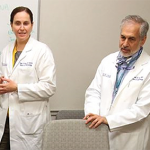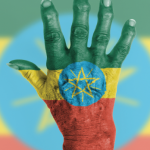One of the healthcare providers at the Bo Government Hospital described how he had escaped from the rebels and hid in a church. He proceeded to peek through a window, only to watch his friends and loved ones butchered. The people have never really recovered from the significant devastation that this war caused, which essentially destroyed the country’s entire infrastructure. The region is abundant in natural resources, including oil and diamonds. There is rich soil ripe for growing. Yet, this country continues to fall behind the rest of the world. Though the war has ended, the country continues to suffer from endemic corruption and is the lowest-ranked country on the Human Development Index and the seventh lowest on the Human Poverty Index.2 The life expectancy is 42 years,3 and 30% of children do not live past the age of five.
Desperate Conditions
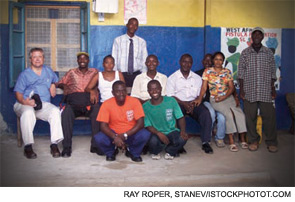
Once we started our work, we quickly realized that the people of Bo had many more compelling needs than the investigation of whether lupus was present in this region. As we made our way from Freetown to Bo, we found that most of the roads were unpaved and were passable only with a four wheel–drive vehicle. The hospital had a hand-pump well for water, but the water from the well was contaminated. There was no running water in the hospital, and a limited generator supplied electricity a few hours a day. On the pediatric ward, Dr. Ruth saw many children with intestinal perforations from typhoid, and we both saw children die from such infections, because there is no surgeon in Bo. These children would certainly never have died in the United States, where resources are abundant.
Almost all of the adults and children are chronically infected with malaria, and all have parasites. Many children came into the clinic severely anemic from malaria, requiring blood transfusions that had to be provided by family members because there is no blood bank. The hospital has no medicine. If a patient needs medicine, the family has to go to town and buy it. The people, for the most part, do not have any money to pay for medicine. The town of Bo has almost 300,000 people and only three doctors, none of whom are surgeons. The Bo hospital is over 400 beds, with one doctor and three providers with military medic training. The entire country of four million people is served by 30 doctors. There are no medical facilities in the entire country with “modern” diagnostic or surgical equipment. In the vast majority of the country, including Bo, there is no electricity, running water, or sanitation.
Building Hope
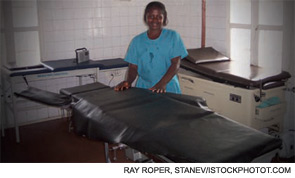
We were astounded by the poverty and the lack of basic necessities, such as water, roads, and sanitation. It was difficult to know how to go about helping these genuinely kind people that had already been through so much. To start, we plan to return to Bo with a larger multidimensional medical team in the fall of 2011, and possibly sooner, to help with the installation of a clean water system. We are in the process of funding a water filtration system to put on the well at the Bo Government Hospital to make the water drinkable. Donations to help fund this effort to provide drinkable water for the hospital and surrounding community can be made to Water Missions International (www.watermissions.org), designating your gift to the Bo, Sierra Leone project. Dr. Maggi is in the planning stages of building a hospital in Bo with a modern operating suite. The purpose of this hospital would be to help train Sierra Leonians to take care of their own people. Donations to help Dr. Maggi’s effort in providing care to women with obstetric fistulas can be made to www.westafricafistulafoundation.org.
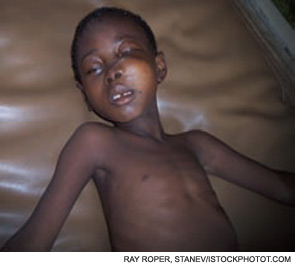
In summary, the voyage that began as a trip to help answer research questions on lupus became much more. Many living in Sierra Leone live in mud huts or have no shelter, and no one has clean water to drink or to wash in. There are multiple aid organizations in the country doing what they can, but there is no coordination of their efforts. Although vaccines are available for the children through the World Health Organization and the Gates Foundation, the problem is getting them to the children because there is no transportation from the villages to healthcare workers. The people of Sierra Leone do not have the basic human necessities that we take for granted in this country. It is clear that, to improve global research in medicine, we all need to work together to find ways to help these impoverished countries enjoy a brighter future.
